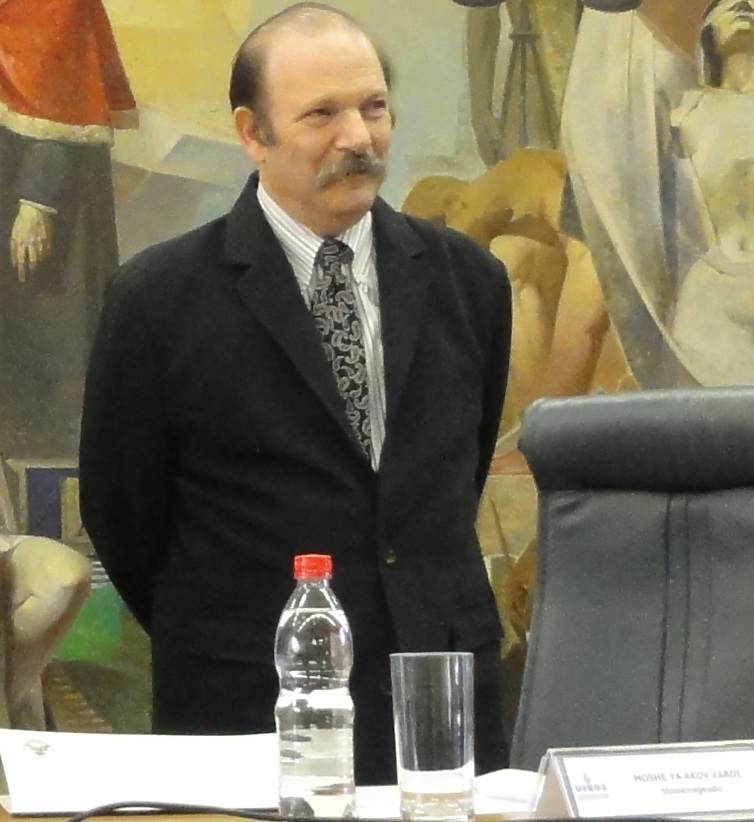
Publicado em: 01/06/2015
Professor Moshe Vardi palestra no INF
O professor Moshe Vardi realizará duas palestras no Instituto de Informática: hoje dia 15/6 às 14h30min – Aula Magna, e amanhã dia 16/6 às 15h, no Auditório do prédio 67. É possível assistir às palestras pelos links abaixo:
O Prof. Vardi é Fellow da AAAI, ACM, IEEE, SIAM e Membro da US National Academy of Engineering, National Academy of Science, the American Academy of Arts and Science, the European Academy of Sciences, e da Academia Europaea.
Palestras:
– 15/6, às 14h30min, teremos uma Aula Magna, no Instituto de Informática:
“If machines are capable of doing almost any work humans can do, what
will humans do?”
– 16/6, às 15h, teremos uma segunda palestra: “P vs. NP”, no Instituto de Informática.
Obs.: As palestras acontecerão no Auditório do prédio 67, do Instituto de Informática da UFRGS.
Biografia resumida do Prof. Vardi:
http://www.cs.rice.edu/~vardi/
Moshe Y. Vardi is the Karen Ostrum George Distinguished Service Professor of Computational Engineering and Director of the Ken Kennedy Institute for Information Technology at Rice University. He chaired the Computer Science Department at Rice University from January 1994 till June 2002. Prior to joining Rice in 1993, he was at the IBM Almaden Research Center, where he managed the Mathematics and Related Computer Science Department. His research interests include database systems, computational-complexity theory, multi-agent systems, and design specification and verification. Vardi received his Ph.D. from the Hebrew University of Jerusalem in 1981. He is the author and co-author of over 500 articles, as well as two books, “Reasoning about Knowledge” and “Finite Model Theory and Its Applications”, and the editor of several collections.
Vardi is the recipient of numerous awards, including three IBM Outstanding Innovation Awards, the 2000 Goedel Prize, the 2005 ACM Kanellakis Award for Theory and Practice, the 2006 LICS Test-of-Time Award, the 2008 ACM PODS Mendelzon Test-of-Time Award, the 2008 ACM SIGMOD Codd Innovations Award, the 2008 Blaise pascal Medal for Computer Science by the European Academy of Sciences, the 2008 ACM Presidential Award, the 2010 CRA Distinguished Service Award, the 2010 ACM Outstanding Contribution Award, the 2011 IEEE Computer Society Harry H. Goode Award, the 2012 EATCS Distinguished Achievements Award, and the Southeastern Universities Research Association’s 2013 Distinguished Scientist Award. He holds honorary doctorates from the University of Saarland, Germany, and the University of Orleans, France. Vardi is an editor of several international journals, and Editor-in-Chief of the Communication of ACM. He is Guggenheim Fellow, as well as a Fellow of the Association of Computing Machinery, the American Association for the Advancement of Science, the Association for the Advancement of Artificial Intelligence, the European Association for Theoretical Computer Science, and the Institute for Electrical and Electronic Engineers. He was designated Highly Cited Researcher by the Institute for Scientific Information, and was elected as a member of the US National Academy of Engineering and National Academy of Science, the American Academy of Arts and Science, the European Academy of Sciences, and the Academia Europaea.
Resumo das Palestras:
15/6, 14h30min: Auditório do Centro de Eventos do INF-UFRGS
If machines are capable of doing almost any work humans can do, what
will humans do?
Moshe Y. Vardi
Rice University
Over the past 20 years Artificial Intelligence (AI) has made a remarkable progress. While AI has been proven to be much more difficult than believed by its early pioneers, its inexorable progress over the past 50 years suggests that H. Simon may have been right when he wrote in 1956 “machines will be capable … of doing any work a man can do.”
I do not expect this to happen in the very near future, but I do believe that by 2045 machines will be able to do if not any work that humans can do, then, at least, a very significant fraction of the work that humans can do.
The following question, therefore, seems to be of paramount importance. If machines are capable of doing almost any work humans can do, what will humans do?
16/6, 15h: Auditório do Centro de Eventos do INF-UFRGS
“P vs NP”
Moshe Y. Vardi
Rice University
The question of P vs. NP is one of the central questions in computer science and mathematics. (It is one of the Clay Institute Millenial Problems whose solution would yield an award of $1,000,000.)
In August 2010, an HP researcher claimed to have solved the problem, using tools from mathematical logic and statistical physics, including a theorem proved by the speaker in 1982.
The claim generated a huge buzz in computer science, with coverage also in the New York Times.
This talk will explain what the P-vs-NP problem is, what tools were employed in the claimed proof, and what the status of the claim is.

